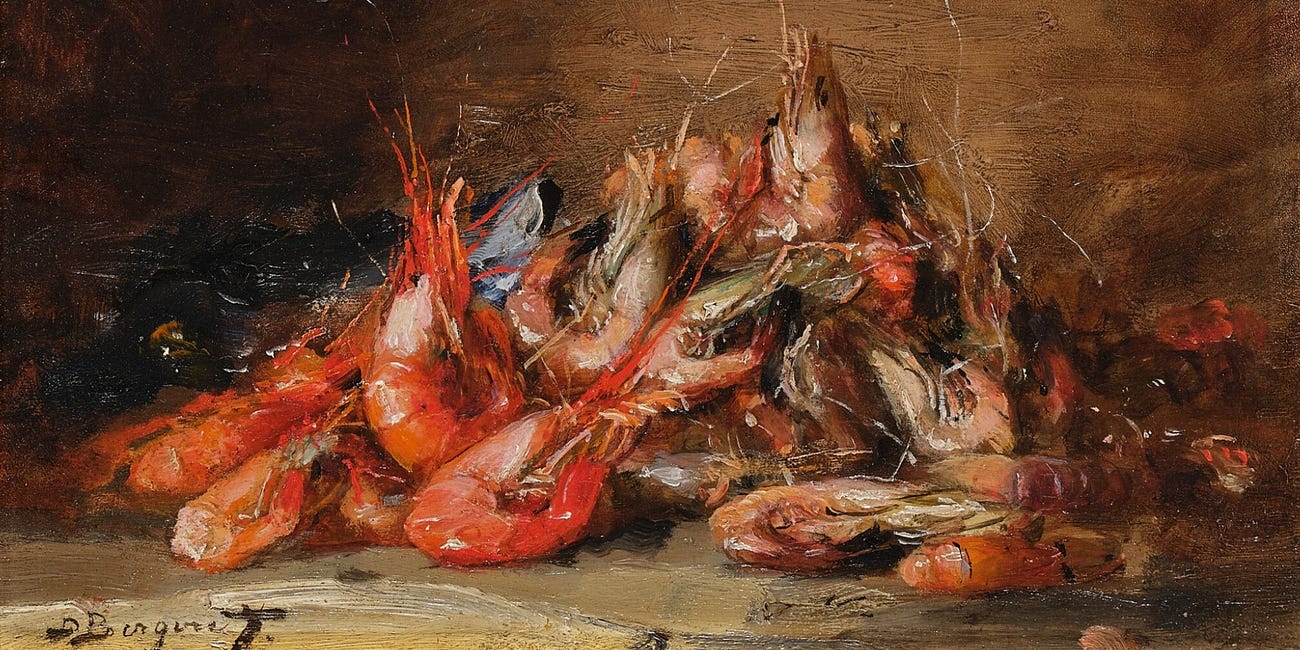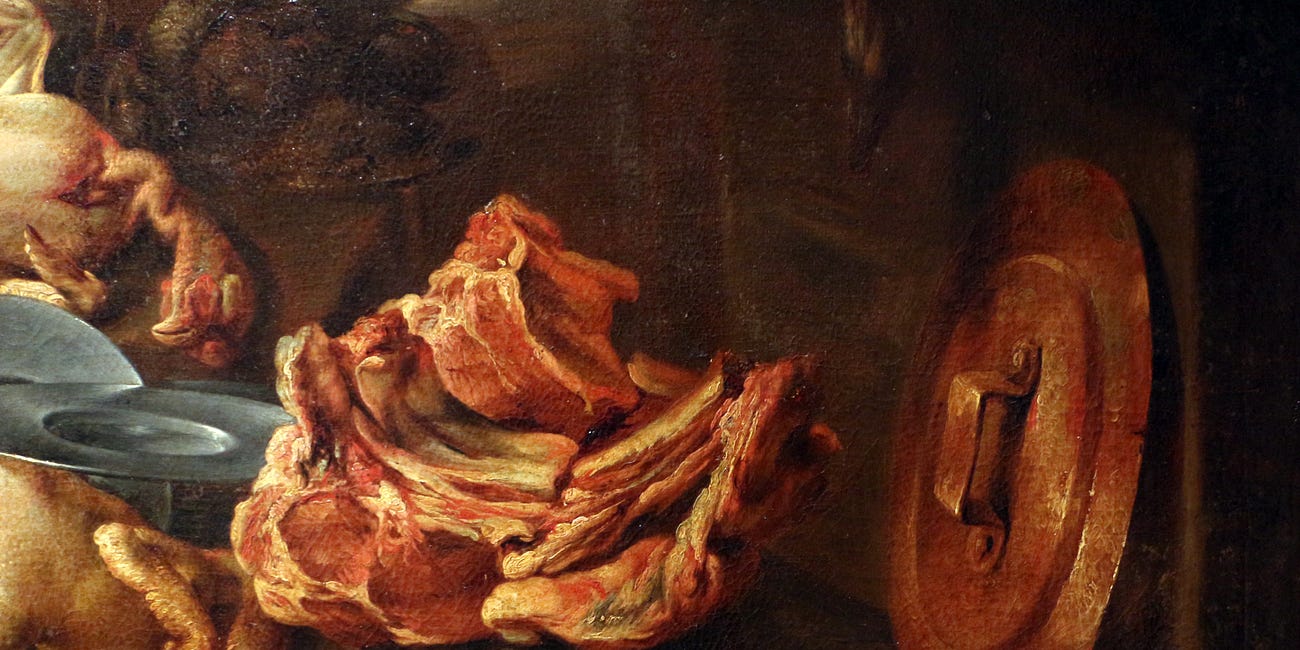I’m an ethical vegan, and think that it’s obviously and trivially wrong to buy animal products in ordinary circumstances. But when I browse something like r/Vegan, I sometimes get the “vegan ick,” and understand why many consider vegans crazy. This might just be due to my idiosyncratic ethical dispositions, but it seems like people are more obsessed with principles and sorting actions into boxes than actually reflecting on each issue, and this sometimes to the detriment of looking reasonable and getting people to support the cause. I thus want to address a few issues where many vegans seem to be a little too principled, and why I think they’re ok.
Eating Roadkill and Leftovers
The most obvious such case is the stance that it’s never okay to eat animal products, even when no animals could be harmed by doing it (and by "it", haha, well. let's justr say. Eating animal products). The classic example of this is roadkill. Suppose that a deer jumps in front of your car—as they have a tendency to do—and is struck dead.
Now, it was clearly a pretty bad thing that this happened, and their deer-family will certainly miss them. Nevertheless, the dear is dead now, and there’s surely no further harm done by eating them. It might be that you find the action disgusting or “ugly” in some way, but it’s just not at all clear to me why it would be morally wrong to eat the deer. Perhaps you want to say that it’s a sign of bad character that you want to eat a corpse, but two can play at that virtue-ethics game, and I have an equally strong intuition that it might be virtuous to eat the deer, so that their death is not in vain; again, it just seems like a matter of aesthetic framing.
I don’t actually think many—even “principled”—vegans would be opposed to this (note: halfway through writing this, I searched r/Vegan, and turns out they are). The stance I usually hear these sorts of vegans take is to be against the exploitation of animals, being categorically against the animal industry, or something to that extent. Since a single road-casualty doesn’t exactly constitute an exploitative industry, this might fall outside the explicit concern of this sort of veganism.
Still, there are many ways to eat meat in a way that might be construed as condoning the animal industry, but which I don’t think are wrong. An obvious example is dumpster-diving, i.e., retrieving otherwise good food from dumpsters. If you find some edible meat in a dumpster, there’s basically no way your action (absent weird deviant causal chains) could cause more animals to be harmed. In that case I have a hard time seeing what’s supposed to be wrong about it, even if it shows support for the animal industry in some highfalutin sense. Actually it’s probably better than eating plant-based food you bought, as filling your caloric needs with trash will avoid some fractional crop-deaths and CO₂ emissions.
Similarly, if you’re at some one-off event like a wedding, vernissage with snacks, or whatnot, and there’s some leftover meat or something, then there’s no link between your eating that thing and some animal being harmed or having their rights violated, since you’re not in any way increasing the demand for animal products. You should of course say that you’re vegan beforehand, if possible/relevant, but if there are still leftovers, then it’s fair game. Here there might be some small moral risk, in that people may perceive you as a bad vegan exemplar or hypocritical, in a way that could make them less likely to be vegans themselves. So it will have to depend on the context.
At this point, I expect some to pull the ultimate trap card: What about eating humans? That’s surely wrong! Here I will—perhaps to your great horror—just bite the bullet and say: no, eating humans is not intrinsically wrong. That isn’t to say that I don’t find the thought of eating human flesh incredibly repulsive—I definitely do. But I also find the thought of eating a big, fat, steaming turd or the thought of my grandparents having sex incredibly repulsive, but those certainly aren’t wrong!
The job of morality isn’t to find out which things we find disgusting, but which are wrong, and the two often come apart. In many cases it would of course be wrong to eat humans, because doing so would conflict with the post-mortem interests of the person (if such exist), the interests of relatives, etc. But I really don’t see anything particularly implausible about there being nothing in-principle wrong with eating human flesh.
In fact, if I try to temporarily rid myself of my cultural conditioning, I can actually see Wari’-style endocannibalism—where you eat the dead as a way to show respect, and have them “live on”—as quite beautiful. This suggests to me that my gut-reaction against humans ultimately just derives from the fact that it’s taboo to do it in my culture, and not from cannibalism being inherently wrong.
Having Pets
In principle opposition to pets seems to be a lot more rare than the above, though I have still seen a few voice it. The idea is that you shouldn’t exploit animals, and owning animals is exploiting them, since they’re individuals rather than property(?). As a form of word association, this makes sense. The thing is, I don’t think the animal cares whether some humans have made an agreement to think that one human owns her—rather she cares how she’s treated. So as long as you treat your pet nicely and properly care for them, they’re obviously not harmed.
The biggest concern many have with pets—and one I agree with—is that many breeders keep the animals in horrible conditions. What are these conditions? In puppy mills, for example, it’s pretty much like factory farms in general: Huge numbers of dogs kept in tiny cages, suffering from malnutrition and untreated diseases, and females bred until they can no longer be used, at which point they’re killed. So pretty bad stuff! If utilitarianism is right, it might be better to buy a dog from a puppy mill than to do nothing with the money, provided you care properly for the dog (though I don’t know nearly enough about the practices of the industry to be confident in this judgement). But that also doesn’t matter, since there are plenty of animals at shelters, whom you can buy instead, and doing so won’t fund horrible breeding conditions—at least for cats and dogs; I’m not too sure about pets like birds, reptiles, etc.
Again you might ask: wOuLd YoU kEeP a HuMaN aS a PeT?!1 Probably not, but if some severely mentally handicapped person needed a place to stay, I can’t see anything wrong with adopting them and caring for them—being as paternalistic as you might be with a pet. If a piece of paper also said I owned that person, then whatever, who cares?
Wearing leather
Finally, a lot of vegans really dig in their heels when it comes to leather. I agree that you definitely shouldn’t buy it from new, but I also think that there’s no reason to be against wearing it in principle. I personally think leather looks pretty nice, and I enjoy the craft of polishing and caring for it. For that reason I have some leather jackets and shoes that (like most of my clothes) I have either inherited or bought second-hand. Acquiring the products in this way almost certainly doesn’t cause any harm to animals,2 and is likely better for the environment than alternatives, as nothing new is produced and leather lasts a long time.
Being annoyingly persistent, you may think “well, you wouldn’t wear human skin.” No, I wouldn’t. But that’s because I would find it disgusting, not because it’s morally wrong. And as it turns out, the culture I’ve grown up in has caused me to think that leather is not disgusting in the same way, and that it in fact looks quite good. I also wouldn’t wear a t-shirt soaked in piss, or skinny jeans and a fedora, but neither of those are immoral.
It might be that I’m ever so slightly increasing the demand for leather, due to the fact that my sharp looks and infectious fashionable radiance3 cause the filthy mob to want to buy leather to be as cool as me, some of which will be new. But despite my chic aura, the impact here is so negligible that it’s not worth considering4—at that point I should also stop using toilet paper, to save the rainforest.
Am I Just Looking for Loopholes?
Much of this might give the vibe of someone doing mental gymnastics in order to be able to eat a hamburger while wearing a sick-ass leather jacket. It’s fine if you think that. I mean, most of the time it will simply be best to pretend that there is something inherently wrong in using animal products, as it can be hard to figure out the consequences of your actions, and it’s better to err on the side of caution. In fact, I feel like there is a sort of virtue in being so against the exploitation of animals that you won’t even do something that symbolically signals condonation of the animal industry. But that doesn’t change the fact that there really isn’t anything inherently wrong with such actions.
This leads me to the reason why this might be slightly important, beyond being a fun exercise in practical-ethical thinking. The problem is that dying on the hill of puritanism, fighting a battle of symbolic offenses, will just turn people off from the cause. On a thread asking whether people wear second-hand leather, someone just replied “No, I’m vegan.” This sort of thinking—using labels and word-associations rather than seriously considering the issues—just signals that you are not careful in your reasoning, and takes credibility away from the vegan position. When you refuse to compromise on cases that don’t fit the vibe of your position, people start considering you a fanatic (and not in the cool decision theory sense), and stop taking your view seriously. Seeing as veganism is incredibly still a minority position, I think it’s generally more effective to be conciliatory, as the position cannot afford to appear crazy and puritanical (though I’m not a psychologist or social scientist, so who knows?).
The wrong lesson to take from this is that you don’t need to be vegan—or at least freegan. Ethical veganism is one of the most obvious conclusions in ethics, so you should definitely be one! But the arguments for the view don’t quite get you to a categorical ban on the use of animal products.
You Might Also Like:
"Surely We're not Moral Monsters!"
Yana Chidiebele has been captured by an evil scientist who has burdened her with a terrible curse: With his incredible science-powers, he has made a grisly machine that detects every time Yana scratches her left butt cheek, and then horribly murders a million sweet old ladies and cute babies! Even though scratching your butt usually doesn’t seem like a …
Buying Meat is Obviously Worse than Bestiality
*Spoiler Alert*: The conclusion is that both are wrong, don't worry!
Sorry, that was rude. You wouldn’t ask such a stupid question.
In Denmark second hand stores usually get all their inventory from donations, and all profits go to charity. I don’t know whether this is how it works elsewhere, but if a second hand store buys its inventory and is for-profit, buying leather products from them might slightly drive demand (though I still suspect negligibly so).
If you really are a famous person who drives fashion trends, then this is probably worth considering, though.









Agreed! I remember telling someone I think eating roadkill is permissible, and they replied "it's not vegan!" and I was like "okay, I don't really care. i care about what's right/wrong". Sometimes people obsess more about some actions vegan-ness than it's actual moral properties
I agree with your conclusions regarding the morality of these actions, but I actually think it’s pragmatically useful to have a clear line like this. In my experience, family members find exceptions like being willing to eat leftovers incomprehensible and will modify their behaviour in ways you don’t want because they can’t understand why you’d be willing to eat in that situation, but not other situations. I’m speaking from experience here because my own parents interpreted me being willing to eat leftovers as implicit permission to order extra meat for me. In fact, because normal people find this kind of moral reasoning, pretty alien and hard to track. It is generally good to have simple rules because what more complicated rules appear clear to you appear like random whims to them. A person who never eats meat or never eats specific categories of meat is much easier to mentally model. Of course, some level of flexibility has its own benefits because people appreciate it when they see your willing to bend your principles for their convenience and will try to reciprocate but be careful that this doesn’t turn into them annoyingly pushing at your boundaries until your behaviour has substantially changed in ways you don’t want. It isn’t intentional, but if people don’t know the boundaries, they’ll end up pushing them especially if they think You enjoy the taste of meat since they value you having fun.